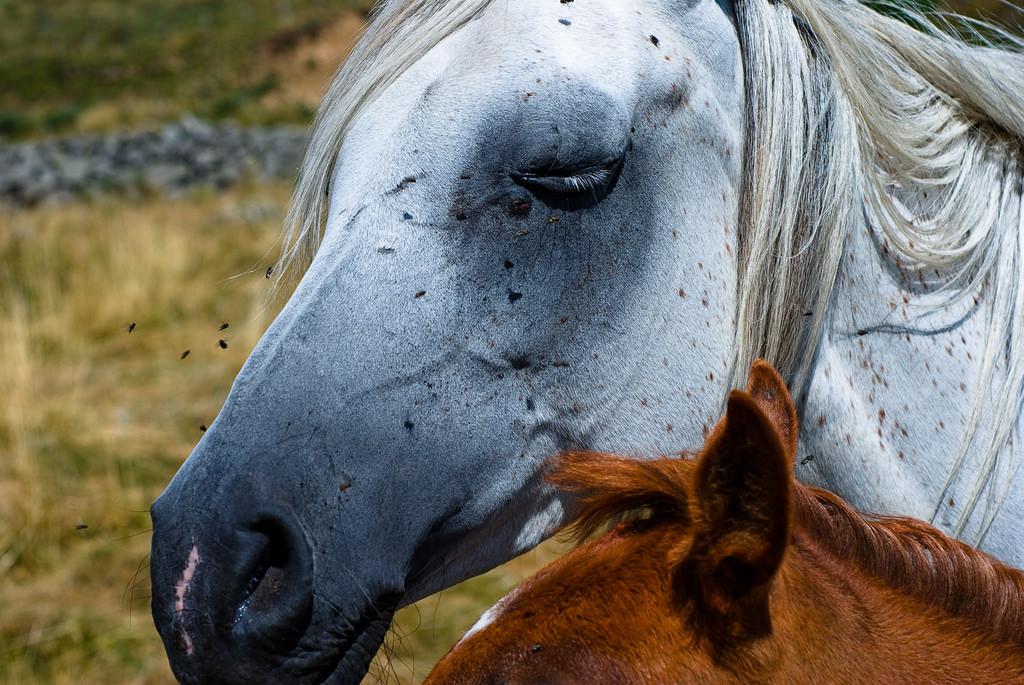
Buzz Off: Alternative Fly Control
For today’s #TBT, we offer these integrative words of advice from Dr. Joyce Harman.
Horseflies, gnats and mosquitos— oh my! This time of year, it’s hard to step foot out the door without being bombarded by biting insects. For our horses, the problem is just as annoying. Though many equestrians turn to fly sprays and pour-on fly control, it’s best to try other options.
“Fly spray can be absorbed through the skin, though that is less of a problem, many times, than breathing, drinking or eating it,” said integrative veterinarian and founder of Harmany Equine Dr. Joyce Harman. “The pour-on fly controls may have much more skin absorption, and there are no tested safe levels in horses.”
If you want to avoid toxic sprays and pour-ons but don’t love the idea of covering your horse with a mask, boots and fly gear everyday, you still have options.
Feed-Throughs
What do apple cider vinegar and garlic have in common with boiled eggs? They’re stinky because of their sulphur content! The flies don’t like the smell of the sulphur in garlic or apple cider vinegar anymore than we do. By incorporating garlic or ACV into your horse’s diet, your horse will become unappetizing to flies!
To be effective, you can’t just feed once a week and expect the flies to stay away from your horse. You should add garlic or ACV daily just before fly season starts for best results.
There is no need to over-feed garlic; 6-8 cloves or a couple tablespoons of dried is plenty. Apple cider vinegar can be safely fed in almost any quantity; the best health benefits come from organic sources, but at least use vinegar made from whole apples. Doses often are 1/8 to 1/2 cup twice a day. You should stop feeding garlic for the winter to give the body a break, as garlic is an herb and it is good to give a break in the winter. Even the vinegar can be given a break in the winter.
Get to Planting!
There are many species of plants that are effective at repelling flies and/or mosquitos, so spruce up your barn area with a few helpful plants. A few are lemongrass, basil and rosemary. If planted out of reach of your horses, you may also plant lavender and marigolds, though be careful because they can be toxic. We may love the smell of these plants, but bugs surely don’t!
Environmental Management
The best way to control pesky flies and mosquitos is through prevention! Think about where bugs like to breed and hangout— manure piles, wet areas and grimy water troughs. So, nip the problem in the bud before those insects can reproduce. While good barn and pasture management won’t make your flies and mosquitos disappear completely, it will definitely help you, and your horse, from getting overrun all summer long.
Natural and Homemade Fly Sprays
There are a number of natural fly sprays on the market that can be beneficial. Like many holistic remedies though, different sprays work better for different individual horses. While one spay might work well on one horse, another natural spray might work better on another.
Making your own fly spray can be a great alternative, too! Plus, depending on how much fly spray you go through in a summer, making your own can save you big bucks after you have the ingredients on hand.
Here’s a recipe from Dr. Harman:
With Witch Hazel as the diluent in a standard spray bottle, add 1oz. of any or a few of the below essential oils (but do not mix more than three):
- citronella
- eucalyptus
- tea tree oil
- pennyroyal
Keep in mind that most essential oils are much too strong to apply undiluted to the horse’s skin, so do your research.
While any one of these tactics won’t leave your horses fly-free all summer, incorporating a handful of these practices will keep you, and your horse, ahead of the bugs.
About Joyce Harman: Dr. Joyce Harman opened Harmany Equine Clinic, Ltd in 1990, bringing holistic healing to horses from all walks of life, backyard retirees to Olympic competitors. Over the years, Dr. Joyce Harman has observed and adapted to the changing needs the industry. Twenty-plus years ago, no one had heard of Lyme disease or Insulin Resistance, yet today that makes up a large part of her clinical practice.
In 2001, she wrote the first paper in a peer-reviewed journal about the possibility that horses have insulin resistance (IR), and now it is part of our every day conversation. In 2004 she published the first comprehensive book on English saddle fitting since the 1800’s, with the western version of the book following in 2006. To this date, these books are the only books written by an author who is independent from a saddle company, which brings unbiased information to the horse world.
In 2015, Dr. Harman released the Harmany Muzzle, a customizable and breathable grazing muzzle designed with the horse in mind. Because she deals extensively with metabolic and insulin resistant horses, she felt it was her duty to offer them a comfortable muzzle option.






Leave a Comment